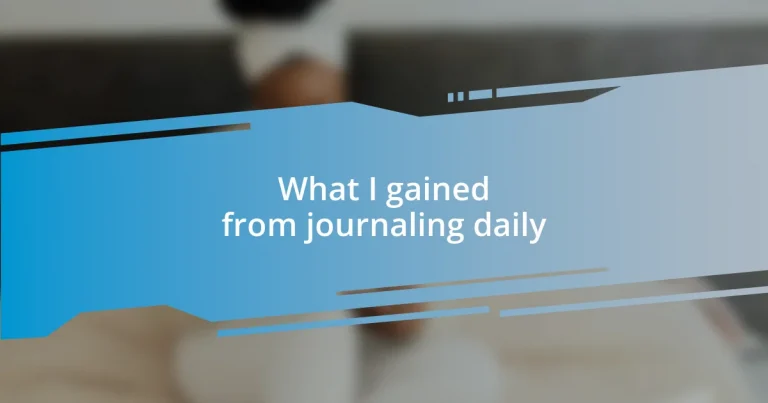Key takeaways:
- Journaling promotes self-reflection and emotional release, helping to manage stress and enhance personal growth.
- Choosing the right journaling method and setting realistic goals are crucial for maintaining a sustainable practice and experiencing enjoyment.
- Journaling facilitates self-discovery, tracks personal growth, and reveals core values, serving as a compass for intentional living.
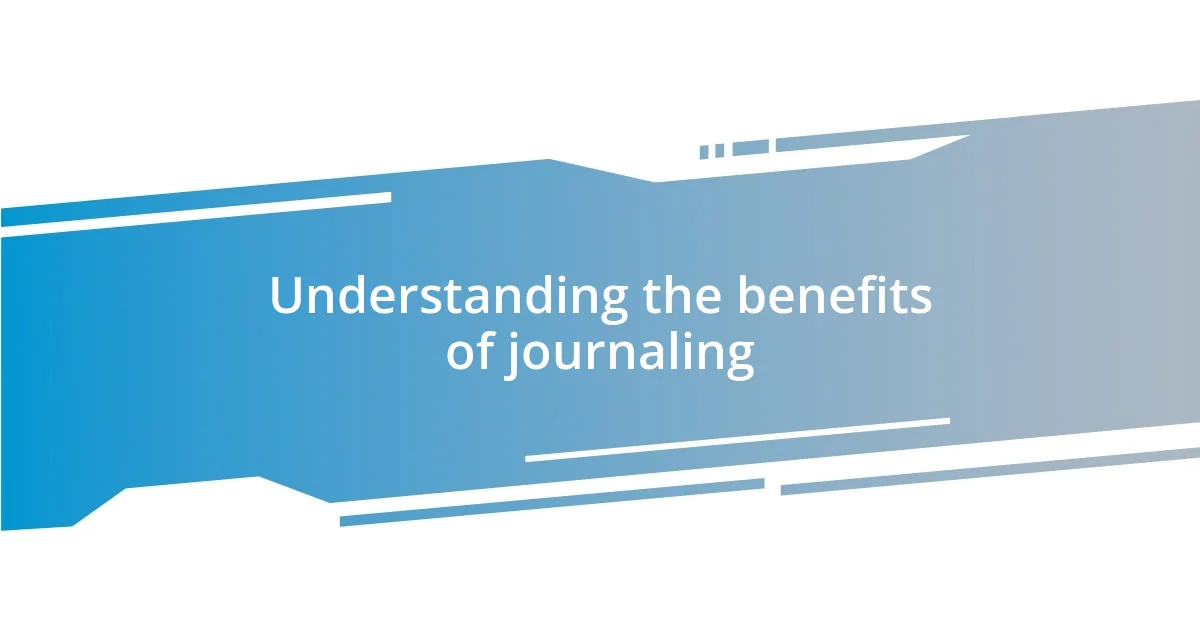
Understanding the benefits of journaling
Journaling has been a transformative tool for me, particularly in managing stress. There were days when overwhelming thoughts crowded my mind, and I found clarity in simply writing those feelings down. Isn’t it fascinating how externalizing our emotions can lighten the mental load?
One key benefit I’ve repeatedly experienced is self-reflection. Through journaling, I’ve been able to explore my thoughts and behaviors in a way that promotes personal growth. I often ask myself questions like, “What lessons can I learn from today?” This practice has opened my eyes to patterns and motivations that I didn’t see before, leading to healthier decisions.
Moreover, I’ve noticed that journaling acts as a sort of emotional release valve. When I write about my day, it’s like unloading my baggage, which helps me reclaim my energy. Have you ever felt lighter after sharing your day with someone? Imagine that feeling, but coming from your own pen—there’s a unique power in that personal dialogue.
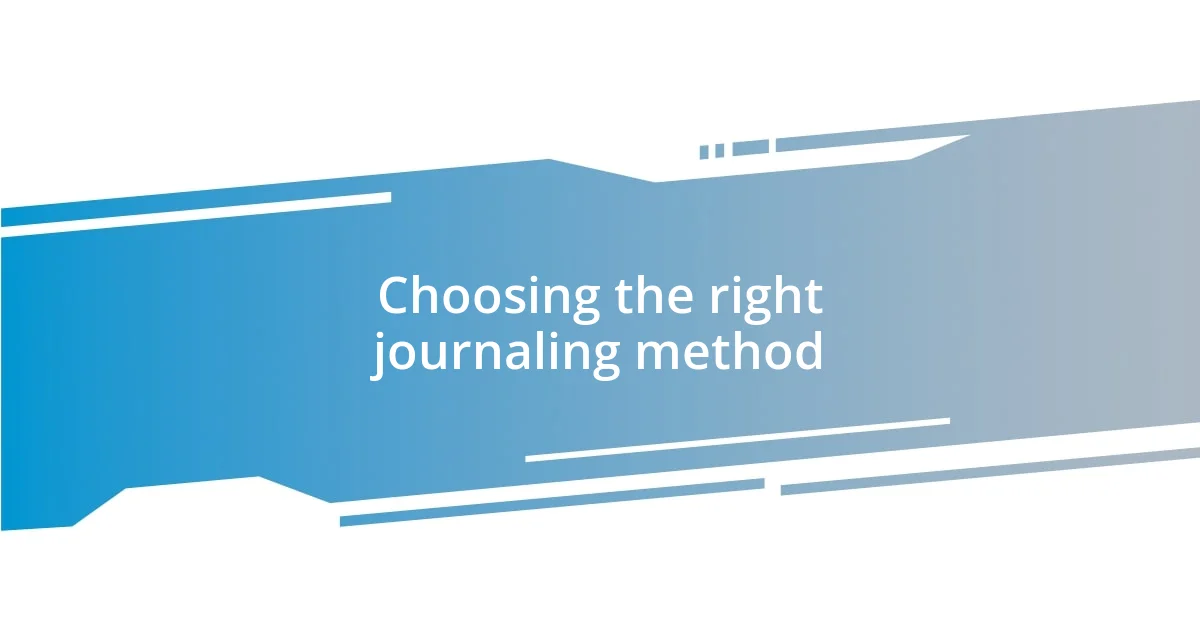
Choosing the right journaling method
Choosing the right journaling method can significantly enhance your experience, and it’s important to consider what feels best for you. Personally, I’ve explored various methods—like bullet journaling or free writing—and each had its unique charm. For instance, bullet journaling provides structure, which can be incredibly satisfying when tracking habits or goals, while free writing allows for a more fluid expression of thoughts, almost like a mental dump. It’s a bit like choosing between a detailed map and simply wandering freely; both can lead to valuable discoveries.
Another aspect to think about is how each method aligns with your lifestyle. If you’re someone who’s always on the go, a digital journaling app might be more feasible. I found that writing my thoughts down on my phone helped me keep the habit alive, especially while commuting. On the other hand, if you enjoy the tactile sensation of pen on paper, a traditional notebook could deepen the connection to your thoughts. Sometimes, the simplest method is the one that resonates most with you, and listening to that instinct can help you stay consistent.
Ultimately, the right journaling method is all about finding your voice and making the experience enjoyable. Reflect on what you want to achieve through journaling. Do you seek clarity, creativity, or accountability? As you experiment with different styles, remember it’s okay to blend them or switch methods as your needs evolve. After all, it’s your journey, and it should feel authentic to you.
| Journaling Method | Description & Benefits |
|---|---|
| Bullet Journaling | Structured, combines planning and creativity; great for tracking goals, habits, and to-do lists. |
| Free Writing | Allows for unfiltered expression; helps clear the mind and tap into creativity. |
| Digital Journaling | Accessible on-the-go; convenient for quick entries and syncing across devices. |
| Art Journaling | Incorporates drawings or visuals; great for those who express themselves better visually. |
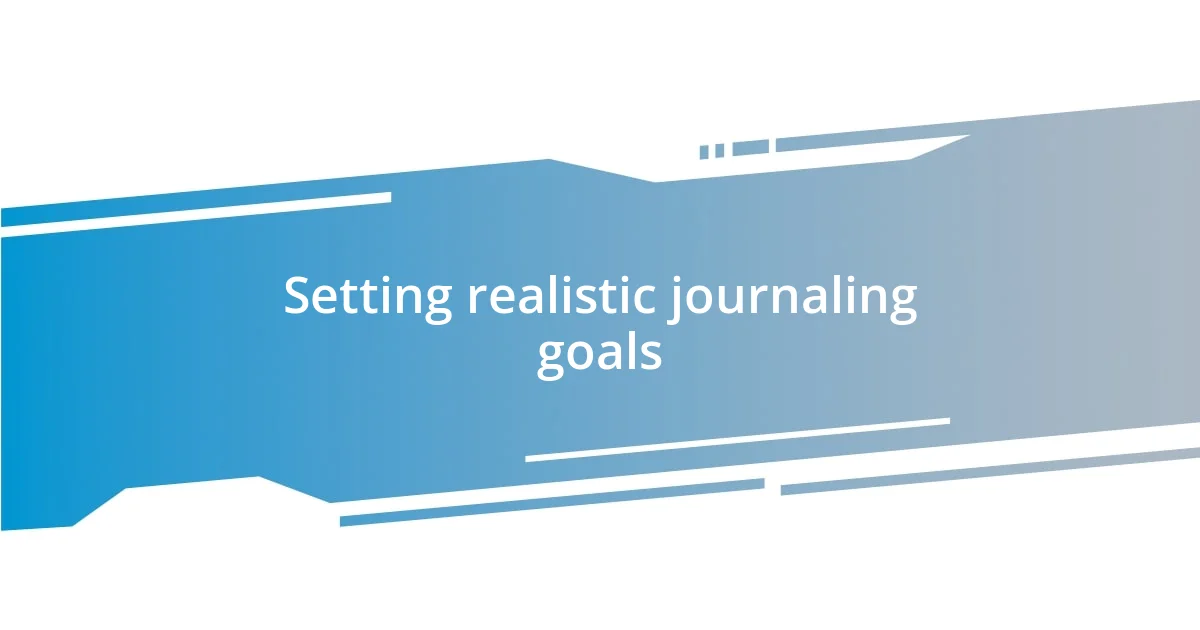
Setting realistic journaling goals
Setting realistic journaling goals is essential for building a sustainable practice. I remember when I first started journaling; I aimed to write for an hour every day, which quickly became overwhelming. Breaking it down into smaller, achievable goals—like five minutes a day—made a significant difference. The key is to approach it with kindness and flexibility, allowing for adjustments as I explore what works best for me.
Consider these helpful tips when setting your journaling goals:
- Start small: Commit to just a few minutes each day instead of overwhelming yourself with long sessions.
- Be specific: Rather than saying “I’ll write daily,” try “I’ll write three times this week.”
- Create a routine: Align your journaling with an existing habit, like a morning coffee or winding down before bed.
- Celebrate progress: Acknowledge every entry, no matter how small. Each one contributes to your journey.
- Adjust as needed: Flexibility is important. If daily journaling feels like a chore, switch to every other day or once a week.
By being intentional about setting realistic goals, I found that journaling became a natural part of my day rather than a burden. Embracing this approach helps foster a deeper connection with my thoughts, creating a welcoming space for self-discovery.
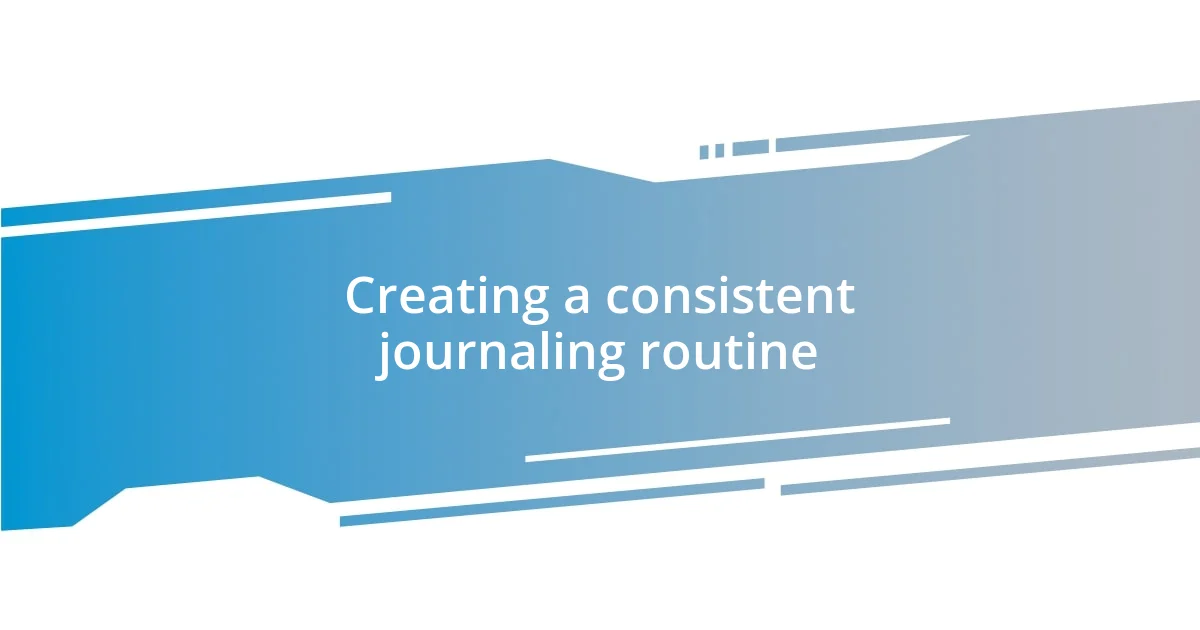
Creating a consistent journaling routine
Establishing a consistent journaling routine starts with choosing the right time and place. I personally found my sweet spot in the early morning, just as the sun began to rise. There’s something magical about that quiet moment—it sets a calm tone for the day. Have you considered how the environment around you affects your writing? If I sat in a noisy café, my thoughts often felt scattered, but at my cozy desk with a warm cup of tea, the words flowed effortlessly.
To further hone my routine, I committed to a particular format. I decided I’d write three things I was grateful for each morning, followed by a stream of thoughts. This structure added a form of predictability, and I discovered that my daily gratitude list often inspired deeper reflections. Have you tried linking specific prompts or themes to your journaling practice? It can make sitting down with your journal feel less daunting and more purposeful.
Sometimes, I’d mix things up to keep it fresh. On days when I felt uninspired, I’d switch to doodling or mind-mapping ideas instead of writing in full sentences. This shift not only reignited my creativity but also allowed me to maintain the habit without the pressure of traditional writing. How might you adapt your approach when motivation wanes? Experimenting with different styles has taught me that consistency doesn’t always mean rigidity; refreshing your routine can keep the process enjoyable and fulfilling.
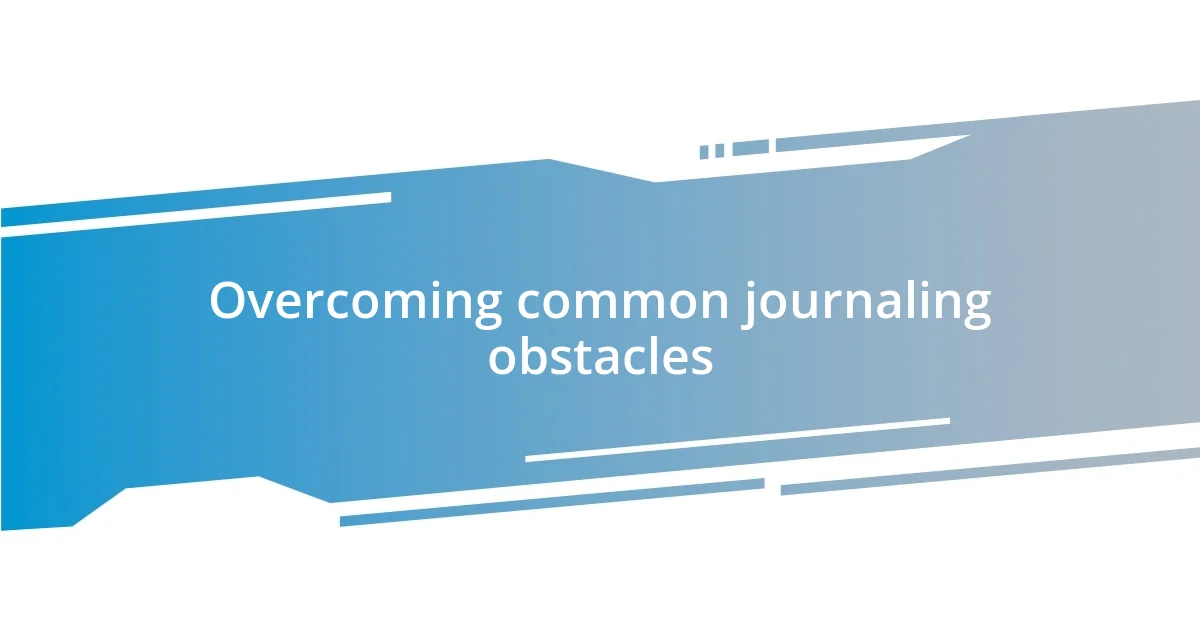
Overcoming common journaling obstacles
I faced several hurdles while trying to make journaling a daily ritual. One of my biggest challenges was the nagging feeling that I needed to write something profound every time. I remember sitting there, pen hovering over the page, feeling anxious about the blank paper staring back at me. I found that reframing my expectations was essential—sometimes, it’s enough to jot down a single thought or even some random memories. What if those seemingly trivial moments are the ones that actually hold the most significance in our lives?
Another obstacle I encountered was the inevitable days when life got in the way. On those particularly hectic days, I felt guilty about not writing and would often toss my journaling practice aside. I realized I needed to give myself permission to skip days without losing my progress. Instead of seeing missed entries as failures, I began to think of them as pauses in a continuous journey. Have you experienced that sense of guilt? It’s important to embrace the ebb and flow of life; after all, journaling should be a source of joy, not a task on your to-do list.
Finding inspiration can also be tricky at times. I recall days where nothing seemed worth writing about, which made journaling feel like a chore. I discovered that keeping a list of writing prompts helped tremendously. Some days, I would even pull a random prompt from a jar and just go with it. This playful approach not only reignited my passion but also pushed me to explore topics I wouldn’t have considered otherwise. What unexpected insights might waiting for you if you allow yourself to step outside your comfort zone? Creating this little ritual of spontaneity turned out to be an effective tool in making my journaling practice feel fresh and engaging.

Sharing insights gained from journaling
Journaling has been a journey of self-discovery for me. Each time I write, I peel back layers of thoughts and emotions that I didn’t even realize were there. For instance, after reflecting on a challenging situation from my past, I often find that I can articulate my feelings more clearly than I could before. Have you ever noticed how your emotions can sometimes feel overwhelming, yet putting them on paper gives you a sense of clarity?
Another insight I’ve gained is the power of tracking personal growth over time. I remember reading through old entries from last year and feeling amazed at how much I’ve evolved. It reminded me that personal progress isn’t always linear and that it’s okay to have setbacks. How do you keep tabs on your journey? Journaling invites me into a dialogue with my past self, allowing me to recognize patterns and celebrate victories, no matter how small they may seem.
What’s truly fascinating is how journaling has a way of revealing my priorities. I often find myself writing about the same recurring themes, whether it’s the importance of family or the pursuit of creative passions. This repetition highlights what truly matters to me. Have you considered what your journal reveals about your core values? I’ve learned that consistent reflection through journaling can serve as a compass, guiding me toward intentional choices that align with my evolving goals.












